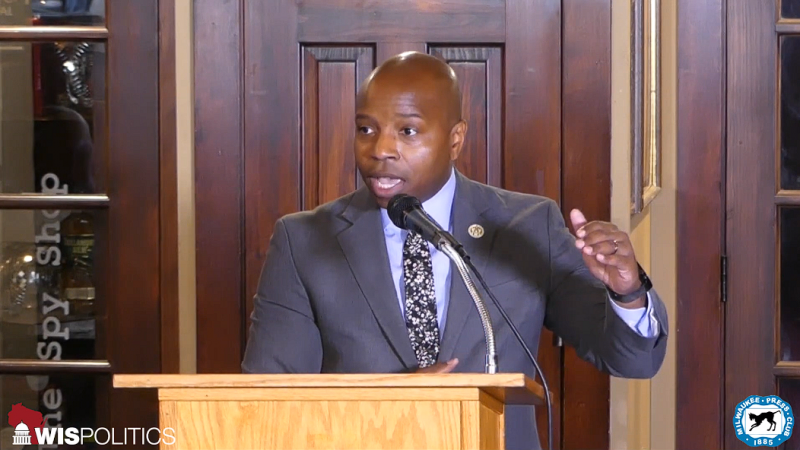Milwaukee Mayor Cavalier Johnson said he has a “strong aversion” to policy measures targeting his city in the state’s shared revenue agreement, adding he wished the issue had been dealt with when Dems had control of the Legislature.
“That didn’t happen, unfortunately. So I didn’t choose the political dynamic of the day, but we’re in it. And it’s my responsibility to solve it, to get something for the city to stand on in the future,” said Johnson, referring to the current GOP-run Legislature.
Johnson spoke at yesterday’s WisPolitics.com-Milwaukee Press Club Newsmaker Luncheon in Milwaukee after the city’s Common Council this week approved a new 2 percent sales tax to meet the city’s ongoing pension obligations. Johnson said he will sign the city sales tax ordinance today.
The Milwaukee County Board could vote later this month on an additional 0.4 percent sales tax. If that’s approved, Milwaukee city residents would see a 7.9 percent combined state and local sales taxes. Johnson and County Exec David Crowley spent months traveling to Madison to help forge a deal.
>> WisPolitics is now on the State Affairs network. Get custom keyword notifications, bill tracking and all WisPolitics content. Get the app or access via desktop.
The shared revenue law Gov. Tony Evers signed included provisions allowing the city and county to implement the new sales taxes through two-thirds votes. But Republicans also inserted many restrictions on the city and county. The Common Council has threatened to sue over those, arguing they undermine local control.
That includes measures barring the city from spending money on diversity, equity and inclusion initiatives, prohibiting the use of property tax dollars for the city’s street car and requiring school resource officers in Milwaukee public schools.
Johnson argued attacks on DEI are part of a larger trend.
“This is a national platform that Republicans have put forward to attack diversity, equity and inclusion,” he said, alluding to a $32 million budget cut to the UW System over DEI.
Johnson demurred when asked about a potential lawsuit, but said he supports asking the Legislature to repeal the provisions.
“There are opportunities for us to still have our values met,” Johnson said.
Johnson also said he hopes to find common ground with the GOP-led Legislature to address gun violence. He said he gets messages throughout the day about people who have been shot and killed, but that city government doesn’t control gun laws.
Johnson said he understands it may not be sweeping legislation.
“But we have to do something more than what the status quo is. The status quo where I’m seeing, and all of us are seeing and witnessing, you know, people being shot fatally or non-fatally every single day,” he said.
Johnson also during the event mentioned homicides in the city are down 30 percent compared to this time last year, noting “there’s still work to do.”
Johnson responded to a measure in the shared revenue law that shifts power to set policies from the Police and Fire Commission to police and fire chiefs, calling it “unnecessary.”
But, he added, the FPC still has some authority to ensure chiefs don’t “step out of line.” Johnson said the FPC would still be able to hold hearings if a chief were to “do something that was egregious” and have power over appointments. He also noted the Common Council could delay policies it may have concerns about.
Johnson during the event said he could end up running for governor or some other statewide office in the future, but he’s focused on his current role.
“I just got here as mayor, and mayors typically serve a very long time in this office, and there’s so much work to do, there really, really is,” said Johnson, who is expected to seek a full four-year term in April 2024 after he became the city’s first elected Black mayor in April 2022 to fill out the term of now-Ambassador Tom Barrett.
Watch the video here.




